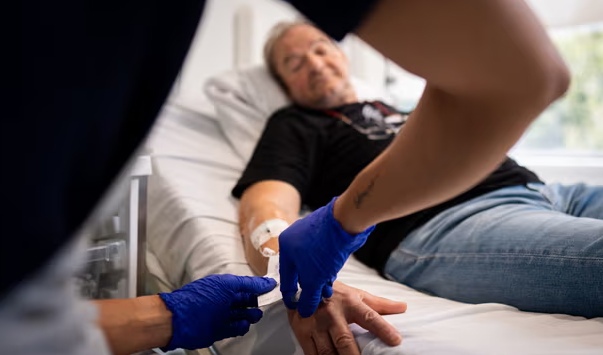Doctors have begun trials of the world’s first mRNA lung cancer vaccine on patients, with experts hailing its “revolutionary” potential to save thousands of lives.
Lung cancer is the leading cause of cancer deaths worldwide, with around 1.8 million people dying from it each year. Survival rates are particularly poor in patients with late-stage forms of the disease, when tumours spread.
Now experts are testing a new shot that causes the body to track down and destroy cancer cells and then prevent them from returning. The vaccine, known as BNT116 and created by BioNTech, is designed to treat non-small cell lung cancer (NSCLC), the most common form of the disease.
The Phase 1 clinical trial, the first human study of BNT116, has begun at 34 research sites in seven countries: the UK, US, Germany, Hungary, Poland, Spain and Turkey.
The UK has six centres located in England and Wales, and the first UK patient received his initial dose on Tuesday.
In total, around 130 patients – ranging from those with early-stage disease before surgery or radiotherapy, to those with late-stage disease or recurrent cancer – will be registered for the vaccination alongside immunotherapy. There will be around 20 people from the UK.
The vaccination uses information RNA (mRNA), similar to the COVID-19 vaccines, and works by giving the immune system tumour markers from NSCLC to prepare the body to fight cancer cells expressing these markers.
Lung cancer vaccine development underway since March
Researchers from Oxford University, the Francis Crick Institute and University College London (UCL) selected the technology used to create the Oxford-AstraZeneca vaccine against COVID-19 in March. The new drug trains the immune system to recognise neoantigens in lung cancer cells and destroy them.
The team has received funding of up to £1.7m from charities Cancer Research UK and CRIS Cancer Foundation to produce 3,000 doses of the vaccine. The aim is to boost a person’s immune response to cancer while leaving healthy cells intact, unlike chemotherapy. Prof. Siow Ming Lee, a consultant medical oncologist at University College London hospitals NHS foundation trust (UCLH), which is leading the trial in the UK, said:
“We are now entering this very exciting new era of mRNA-based immunotherapy clinical trials to investigate the treatment of lung cancer. It’s simple to deliver, and you can select specific antigens in the cancer cell, and then you target them. This technology is the next big phase of cancer treatment.”
